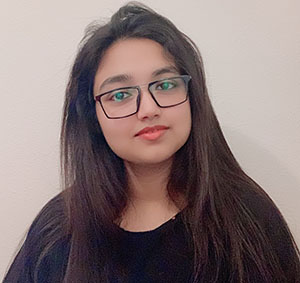Support with teaching from the undergraduate learning assistants was appreciated even more than usual spring term, as all classes switched to remote teaching due to the coronavirus pandemic. In recognition of the students’ efforts, a new award was created in the School of Electrical Engineering and Computer Science. Greg Healy and Nadia Najim received the awards this year which included a certificate and $500.

Greg Healy holds bachelor’s and master’s degrees in civil engineering and is pursuing a degree in computer science to become a full-stack web developer. He has been the learning assistant for the web development course for the online degree program in computer science for postbaccalaureate students.
In course evaluations, the students said Healy was as the most influential component of their success. In addition to being extremely responsive to student questions, he also created video demonstrations to walk students through more challenging content. When asked by the course instructor, Eric Ianni, to review assignments and suggest improvements, Healy went one step further and designed several assignments that built to a towards a final assignment.
“Greg is a once in a lifetime undergraduate learning assistant,” Ianni said.

Nadia Najim is a bachelor’s student in applied and computational mathematics. She has been an undergraduate learning assistant for large electrical engineering courses and served as the head assistant where she managed a team of up to 12 other assistants. Najim was nominated by four faculty who wrote in their letter that she “made sustained and absolutely outstanding contributions to the education of more than 2,000 undergraduate students.”
By creating reusable content, Najim has made an impact beyond her own interactions with students. She generated weekly topical material, including group and individual practice problems, as well as guidance and training for fellow assistants on best practices, tips, and tricks for approaching each course topic.
Najim’s skills were especially appreciated by Pallavi Dhagat, professor of electrical and computer engineering, who taught engineering fundamentals for the first time in spring term.
“All through the term, she kept ahead of me, alerting me to what was coming next in the recitation sessions, creating sample problems for help sessions before the midterm and final exams, rallying the other learning assistants and students during stressful times in the term, advising me on concepts she felt I could reinforce in my lectures and giving me valuable feedback on the length and difficulty of my exams,” Dhagat said.








